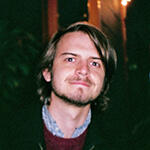by Sam Veremchuk
 What is the proper academic voice when Ukraine is attacked? Is it necessary to maintain an “unbiased” voice in academic discussion when there is a clear oppressor? I had been thinking about these ideas before the February full-on invasion of Ukraine, but these questions were brought into focus last week in our “Ukraine in the World: Exploring Contemporary Ukraine” class. Our class read a paper titled, “The logic of competitive influence-seeking: Russia, Ukraine, and the conflict in Donbas;” which was about Russian destabilization leading up to its invasion of Ukraine, specifically the Donbas region, in 2014. Members of the class raised questions about the detached tone of the essay. It was presenting this information in a very academic way, attempting to remain “objective.”
What is the proper academic voice when Ukraine is attacked? Is it necessary to maintain an “unbiased” voice in academic discussion when there is a clear oppressor? I had been thinking about these ideas before the February full-on invasion of Ukraine, but these questions were brought into focus last week in our “Ukraine in the World: Exploring Contemporary Ukraine” class. Our class read a paper titled, “The logic of competitive influence-seeking: Russia, Ukraine, and the conflict in Donbas;” which was about Russian destabilization leading up to its invasion of Ukraine, specifically the Donbas region, in 2014. Members of the class raised questions about the detached tone of the essay. It was presenting this information in a very academic way, attempting to remain “objective.”
The next day, I listened to “The War in Ukraine: What Can Scholars Do?” as part of the HUSI Public Events series. All of the speakers are doing amazing work for Ukraine right now, but I wanted to know what academics can do, in their academic work, for Ukraine. I asked this question of the speakers, and the answers varied. Kimberly St. Julian-Varnon provided some advice on how to be visible on campus, by getting involved in the student union and seeking to invite speakers, etc. Dr. Steven Seegel and John Vsetecka’s answers were more about fighting for what we believe in our writing, while suggesting that we need to remain objective in our language. Our beliefs need to be backed up with facts, in other words. All of their responses helped with my thoughts on the issue.
I think I have decided to be a lot blunter in my academic writing. Striking a balance with the academic voice is difficult, and I have to remain professional if I want to be heard, but I feel like I have had to tip-toe too much in my research so far. I did a lot of self-censoring in my Master’s program.

I research turn-of-the-century East European art for the most part (such as the futurists, supremacists, etc.), with a focus on Ukrainian artists in particular. I have been nervous to call them Ukrainian in my writing because these artists’ nationalities are contested, but academia and Ukrainian history are a battlefield as well. Ukrainian writers and artists were behind some of the most avant-garde ideas of the time, yet this is taken away from Ukraine and attributed to the “Russian Avant-garde.” I practiced self-censoring in more contemporary topics as well, such as in papers about 1990s Ukrainian art, Orange Revolution art, Maidan art, and wartime art. I did all this because I did not want to come across as a “nationalist.” The idea of writing about Russia as a colonizer felt fringe to me prior to 2022, and I also received some pushback from faculty. But the audacity of Russia’s recent crimes has opened up the world to the idea of Russia as a colonial oppressor.
I do not believe that my entire academic career will be devoted to talking about Russian colonial ambitions and crimes, but I know that these issues need to be brought into the discourse. I believe that a Ukrainian voice needs to do this, and currently in the United States there is a deficit of Ukrainian art historians. I am grateful for the opportunity to learn about Ukrainian history and Ukraine’s place in the current world, as well as to hear all the amazing discussions this summer as part of the Harvard Ukrainian Summer Institute.